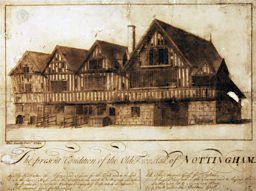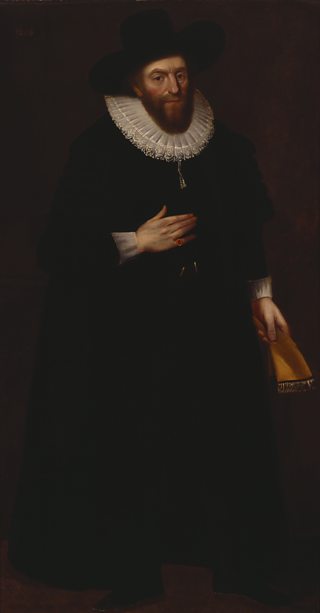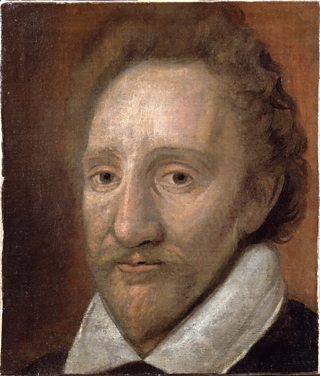The King’s Men perform in Nottingham
Records show that Shakespeare’s group of actors, The King’s Men, visited and performed in Nottingham between 1614 and 1615…around a year before the playwright died.
The troupe were paid 13 shillings and 4 pence by civic leaders.
-
![]()
Much ado near me
Hear more Shakespeare stories on BBC Radio Nottingham
-
![]()
Shakespeare Festival 2016
The BBC celebrates the genius of the bard

By the time of the King’s Men’s first visit to Nottingham in 1614-15 Shakespeare is thought to have retired to Stratford-upon-Avon and would not therefore have been with the travelling troupe, but there’s a good chance that at least some of his plays were in their touring offer, as they continued to be part of the repertory in London right up until 1642.
Indeed, by 1614-15 the players would have had access to all of Shakespeare’s plays, his final work for the troupe – the co-authored The Two Noble Kinsmen with John Fletcher – probably being completed in 1613-14 and perhaps therefore included in the touring repertory in 1614-15 as one of the company’s newest plays and an example of romance drama, the latest hit genre on the London stage.
The civic records do not tell us where or what Shakespeare’s company performed when they visited in the Jacobean and Caroline eras, but the usual venue for civic entertainments was the old Guild Hall which stood on the south side of Weekday Cross. The medieval building does not survive to the present, having been demolished in 1895 to make way for a new branch of the railway, but surviving evidence suggests that the large council hall was on the first floor.
The King’s Men were formed by the new King James when he first came to power in 1603 on the death of Elizabeth I.
It was among the King’s first acts, and gave royal approval to Shakespeare’s troupe, who until then had been known as the Lord Chamberlain’s Men.
Shakespeare wrote the majority of his plays for this group of actors, and he himself took the occasional part, and it is widely agreed joined the occasional tour.
The Royal Connections
Dr Siobhan Keenan, Reader in Shakespeare and Renaissance Literature, De Montfort University, Leicester
On 25 August 1642 King Charles I famously raised the royal standard at Nottingham, marking the official start of the English Civil Wars.
But the King’s men who had flocked to Nottingham in 1642 were not the first King’s men or royal servants to whom the city played host.
During Shakespeare’s lifetime and after, Nottingham was also visited regularly by royal and noble acting companies, including Shakespeare’s company, The King’s Players, also known as The King's Men.
Shakespeare’s troupe is first recorded in the city in the years immediately preceding their most famous playwright’s death, receiving 13 shillings and 4 pence from the corporation in 1614-15. They were paid again in 1620-1, this time with Princess Elizabeth’s players, and again on their own in 1628-9, 1629-30 and 1635-6.
By the time of the final payment, though, the London-based King’s Men were not the only King’s players to have visited Stuart Nottingham. The city’s records also include payments to the King’s Players of the Chamber of Bristol (1623-4, 1626-7, 1629-30, 1630-1), the King’s Players of York (1632-3, 1633-4, 1635-6), the King’s Players of Windsor (1630-1) and the King’s Revels players (1623-4, 1626-7, 1629-30, 1630-1, 1632-3, 1633-4).
The popularity of the town with royal players, and vice versa, might well be evidence that Nottingham was known for its royalist sympathies long before the civil wars.
A royal beginning for the King’s Men
By Alan H Nelson, Record for Early English Drama editor
When Queen Elizabeth died on 24 March 1603, James the Sixth of Scotland acceded to the throne of England as James the First. But as James was in Edinburgh, he required more than a month to get to London.

By the time James got to London, plague was so rife that he postponed his coronation ceremony for almost a year. The same plague shut down the playhouses, leaving players without employment, at least in London.
In the meantime the King's administration carried out its normal functions. On 18 May a warrant was issued authorizing William Shakespeare and his companions to perform plays throughout the realm under royal patronage: the former Lord Chamberlain’s players were now the King’s Men.
Ten months later, on 15 March 1604, James finally had his coronation procession. As the festive day approached, the Lord Chamberlain issued red or scarlet cloth, to be made into livery garments, to more than a thousand royal servants, including twenty-eight players.
From the notebook recording the purchase and distribution of cloth we know the names of three playing companies, the King’s Men, the Queen’s Men, and the Prince’s Men, and we know the names of the nine or ten principal players of each company. The King’s Men were headed by William Shakespeare, the Queen’s Men by Christopher Beeston, and the Prince’s Men by Edward Alleyn. (The queen was Anne of Denmark. The prince was Henry, heir apparent until his tragic death in 1612.)
We don’t know exactly what William Shakespeare did with his four and a half yards of red cloth, or what role he played. The liveried players may have marched in procession, or may have lined the processional route. Two members of the Prince’s Men, Edward Alleyn, famous for his stentorian voice, and William Bird alias Bourne, proclaimed speeches at pageants which lined the processional route; maybe Shakespeare and his men did the same.
Some months later, from 9 to 26 August 1604, twelve fellows of the King’s Men were paid for their attendance upon the Spanish Ambassador at Somerset House. Here they performed not on stage, but literally as royal servants. With a likelihood approaching certainty, one of the twelve grooms of the chamber at Somerset House in August 1605, doubtless dressed in livery, was William Shakespeare.
Just who were the King’s Men?
The King’s Men was the acting company in which Shakespeare was a member for most of his writing and acting career.

They were known as the Lord Chamberlain’s Men during the reign of Elizabeth I and become the King’s Men by the royal decree of King James I when he came to power in 1603.
In the royal patent of 1603, the King’s Men were named as – Lawrence Fletcher, William Shakespeare, Richard Burbage, Augustine Phillips, John Heminges, Henry Condell, William Sly, Robert Armin, Richard Cowley…”and the rest of their associates…”.
By the time of the troupe’s visit to Nottingham in 1614/15, several of the actors named in the patent had already died.
But lead actor Richard Burbage, who played Shakespeare’s demanding male parts – Richard III, Othello, King Lear, Antony and Macbeth – never retired from the stage and continued acting until his death in 1619.
Shakespeare on Tour
From the moment they were written through to the present day, Shakespeare’s plays have continued to enthral and inspire audiences. They’ve been performed in venues big and small – including inns, private houses and emerging provincial theatres.

BBC English Regions is building a digital picture which tracks some of the many iconic moments across the country as we follow the ‘explosion’ in the performance of The Bard’s plays, from his own lifetime to recent times.
Drawing on fascinating new research from Records of Early English Drama (REED), plus the British Library's extensive collection of playbills, as well as expertise from De Montfort University and the Arts and Humanities Research Council, Shakespeare on Tour is a unique timeline of iconic moments of those performances, starting with his own troupe of actors, to highlights from more recent times. Listen out for stories on Shakespeare’s legacy on your BBC Local Radio station from Monday 21 March, 2016.
You never know - you might find evidence of Shakespeare’s footsteps close to home…
Craig Henderson, BBC English Regions
Related Links
Shakespeare on Tour: Around Notthingham
-
![]()
Cushman sisters visit Nottingham
Star-crossed sisters play Romeo and Juliet
-
![]()
First black Shakespearean stars in Nottingham
Ira Aldridge performs on Nottingham's stage
-
![]()
Shakespeare stars in Madame Tussaud's
Celebrated wax sculptor pays homage to Shakespeare in Nottingham exhibition
Shakespeare on Tour: Around the country
-
![]()
Ira Aldridge
Ira Aldridge - the first black Shakespearean actor
-
![]()
Blossoming at the Rose Theatre
Shakespeare, budding playwright and actor, at the Rose Theatre from the spring of 1592
-
![]()
Will Kemp dance finished in Norwich
Why did Will Kemp, Shakespeare's former clown, dance from London to Norwich?
-
![]()
London's Female Romeo
Charlotte Cushman, the American actress who took Victorian London by storm







